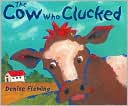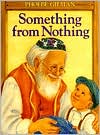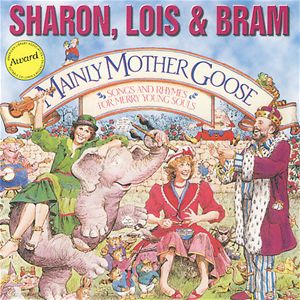 During several consecutive storytimes you would choose a song to sing every time. For example, I chose Row Your Boat.In each storytime we sing the song correctly:
Row, row, row your boat; gently down the stream
Merrily, merrily, merrily, merrily; life is but a dream.
Then we sing the song again in a silly way, changing the first sound of each word:
Bow, bow, bow, bour boat, bently, bown be bream
Berrily, berrily, berrily, berrily; bife bis but ba bream.
Then we sing it again correctly.
Early Literacy Aside--Example: Singing nonsense songs like this help children hear the smaller sounds in words, in a fun way! Try it with different songs. Being able to change the first sound in a word is part of phonological awareness.
During several consecutive storytimes you would choose a song to sing every time. For example, I chose Row Your Boat.In each storytime we sing the song correctly:
Row, row, row your boat; gently down the stream
Merrily, merrily, merrily, merrily; life is but a dream.
Then we sing the song again in a silly way, changing the first sound of each word:
Bow, bow, bow, bour boat, bently, bown be bream
Berrily, berrily, berrily, berrily; bife bis but ba bream.
Then we sing it again correctly.
Early Literacy Aside--Example: Singing nonsense songs like this help children hear the smaller sounds in words, in a fun way! Try it with different songs. Being able to change the first sound in a word is part of phonological awareness.
The next week when we sing Row Your Boat changing the first sound of each word to a different sound. For example: Low, low, low lour loat; lently lown le leam Lerrily, lerrily, lerrily, lerrily; life lis lut la leam. Sometimes the children like to make their own changes and sing to the group.

 Super Duper 1, 2, 3
Can you say this word (or name) with me?
[volcano--or word/name of your choice]
Say it (You say it)
[Children/adults repeat the word with you]
Clap it (You clap it) (Say it again and clap it)
[Children/adults clap the word with you, one clap per syllable]
Snap it [snap fingers] (Say it again and snap it)
[Children/adults snap fingers together with you, one snap per syllable]
Tap it [tap with foot or tap knees] (Say it again and tap)
[Children/adults tap feet (or knees) with you, one tap per syllable]
Early Literacy Aside–Example: You can do this little song with any word! Dividing words into sound parts, into syllables, helps children hear the smaller sounds in words, one part of phonological awareness, the ability to hear the smaller sounds in words.
Super Duper 1, 2, 3
Can you say this word (or name) with me?
[volcano--or word/name of your choice]
Say it (You say it)
[Children/adults repeat the word with you]
Clap it (You clap it) (Say it again and clap it)
[Children/adults clap the word with you, one clap per syllable]
Snap it [snap fingers] (Say it again and snap it)
[Children/adults snap fingers together with you, one snap per syllable]
Tap it [tap with foot or tap knees] (Say it again and tap)
[Children/adults tap feet (or knees) with you, one tap per syllable]
Early Literacy Aside–Example: You can do this little song with any word! Dividing words into sound parts, into syllables, helps children hear the smaller sounds in words, one part of phonological awareness, the ability to hear the smaller sounds in words.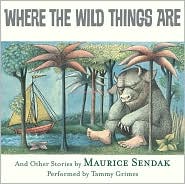

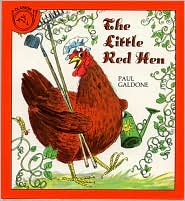
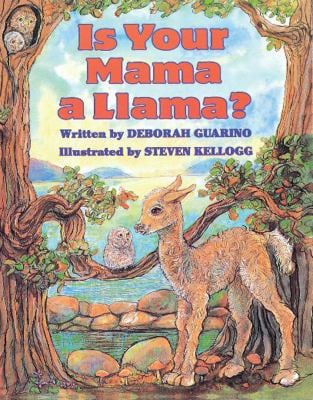
 Early Literacy Aside--Explain: Vocabulary is a very important early literacy skill. By vocabulary, I mean knowing the meanings of words. Today we're focusing on the concept of opposites.
Read the book Maisy Big, Maisy Small by Lucy Cousins with time to allow participants to respond with the opposite word. [Add a synonym for a couple of the words as well. If a participant gives a different word for the opposite word, comment on it. For example if you say big and the book says small, but a child says tiny, you can note that tiny and small have similar meanings and both are the opposite of big.]
Early Literacy Aside--Example: Using this book your children filled in the word meaning the opposite of the one I said from the book. You can always add more interesting words for both the opposite and synonyms for some words. In this way you build your children's vocabulary.
Early Litearcy Aside--Empower: Today in storytime we talked about opposites. As you go about your day, when talking about feelings (hungry, full, tired, wide awake), about what you are doing (relaxing, hurrying, walking slowly, running quickly), or playing, there are many opportunities to think of opposites which builds your children's vocabulary. These little things you do throughout the day will later help them understand what they read.
Early Literacy Aside--Explain: Vocabulary is a very important early literacy skill. By vocabulary, I mean knowing the meanings of words. Today we're focusing on the concept of opposites.
Read the book Maisy Big, Maisy Small by Lucy Cousins with time to allow participants to respond with the opposite word. [Add a synonym for a couple of the words as well. If a participant gives a different word for the opposite word, comment on it. For example if you say big and the book says small, but a child says tiny, you can note that tiny and small have similar meanings and both are the opposite of big.]
Early Literacy Aside--Example: Using this book your children filled in the word meaning the opposite of the one I said from the book. You can always add more interesting words for both the opposite and synonyms for some words. In this way you build your children's vocabulary.
Early Litearcy Aside--Empower: Today in storytime we talked about opposites. As you go about your day, when talking about feelings (hungry, full, tired, wide awake), about what you are doing (relaxing, hurrying, walking slowly, running quickly), or playing, there are many opportunities to think of opposites which builds your children's vocabulary. These little things you do throughout the day will later help them understand what they read. Book Introduction: In this book Let's Go Froggy by Jonathan London, there is a repeated phrase, "flop, flop, flop" when his mother calls to froggy. Let's hear you say, "flop, flop, flop." You'll say it each time Froggy's mother calls him.Read the book.
Early Literacy Aside--Example: Having your child say a repeated phrase with you throughout the entire book keeps him/her involved. This is one way you support print motivation, an enjoyment of books.
Book Introduction: In this book Let's Go Froggy by Jonathan London, there is a repeated phrase, "flop, flop, flop" when his mother calls to froggy. Let's hear you say, "flop, flop, flop." You'll say it each time Froggy's mother calls him.Read the book.
Early Literacy Aside--Example: Having your child say a repeated phrase with you throughout the entire book keeps him/her involved. This is one way you support print motivation, an enjoyment of books.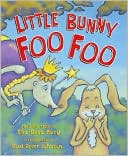 Book Introduction: Our next book is a songbook called Little Bunny Foo Foo by Paul Johnson. Let's sing it together.Early Literacy Aside--Example: You may want to share this songbook with your child at home and point out some of the phrases. You child will like to sing the refrain with you! By making the sharing of books enjoyable, you are supporting print motivation. Your child will want to learn to read.
Book Introduction: Our next book is a songbook called Little Bunny Foo Foo by Paul Johnson. Let's sing it together.Early Literacy Aside--Example: You may want to share this songbook with your child at home and point out some of the phrases. You child will like to sing the refrain with you! By making the sharing of books enjoyable, you are supporting print motivation. Your child will want to learn to read. Fingerplay:Stir a bowl of gingerbread (pretend to stir)
Smooth and spicy brown
Roll it with a rolling pin (pretend to roll dough)
Up and up and down
With a cookie cutter (imitate)
Make some little men
Put them in the oven (imitate)
'Til half past ten! (pretend to look at watch)
Early Literacy Aside--Example: Rhyming is one way that children learn to hear the smaller parts of words, also called phonological awareness. Talking about the words that rhyme as you say rhymes with your children will better prepare them to read when they begin to sound out words in school. Adding motions makes it more fun!
Fingerplay:Stir a bowl of gingerbread (pretend to stir)
Smooth and spicy brown
Roll it with a rolling pin (pretend to roll dough)
Up and up and down
With a cookie cutter (imitate)
Make some little men
Put them in the oven (imitate)
'Til half past ten! (pretend to look at watch)
Early Literacy Aside--Example: Rhyming is one way that children learn to hear the smaller parts of words, also called phonological awareness. Talking about the words that rhyme as you say rhymes with your children will better prepare them to read when they begin to sound out words in school. Adding motions makes it more fun! Early Literacy Aside--Empower: Nursery rhymes are important to do with your children, not only here in storytime, but at home as well. The rhyming and repetition of words helps your child develop the awareness of different word sounds. This helps develop their phonological awareness which is important for later sounding out words. Also, nursery rhymes are fun to sing and act out!
Submitted by Michelle Edwards, Gloucester Library (VA)
Early Literacy Aside--Empower: Nursery rhymes are important to do with your children, not only here in storytime, but at home as well. The rhyming and repetition of words helps your child develop the awareness of different word sounds. This helps develop their phonological awareness which is important for later sounding out words. Also, nursery rhymes are fun to sing and act out!
Submitted by Michelle Edwards, Gloucester Library (VA)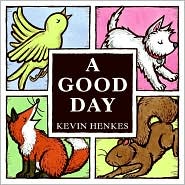 Book Introduction: In this book there are four animals (point to them on the cover)--a yellow bird, a white dog, an orange fox, and a brown squirrel. For each animal something sad happens, but then something good does, too! Let's see what happens.Read the book A Good Day by Kevin Henkes.
Sometimes something happens to us that makes us sad, but then we find a way to be happier. I am going to give each person a piece of paper and there are some crayons to share. I would like you to draw a picture of a time you were sad and a time you could make yourself happy. Then tell me or the adult who brought you about your picture.
Early Literacy Aside--Example: Adults, having your child describe their experiences and feelings aloud gives you an opportunity to develop their vocabulary and background knowledge. You can add more words to what they already use and also explain more about the situations they describe.
Book Introduction: In this book there are four animals (point to them on the cover)--a yellow bird, a white dog, an orange fox, and a brown squirrel. For each animal something sad happens, but then something good does, too! Let's see what happens.Read the book A Good Day by Kevin Henkes.
Sometimes something happens to us that makes us sad, but then we find a way to be happier. I am going to give each person a piece of paper and there are some crayons to share. I would like you to draw a picture of a time you were sad and a time you could make yourself happy. Then tell me or the adult who brought you about your picture.
Early Literacy Aside--Example: Adults, having your child describe their experiences and feelings aloud gives you an opportunity to develop their vocabulary and background knowledge. You can add more words to what they already use and also explain more about the situations they describe.